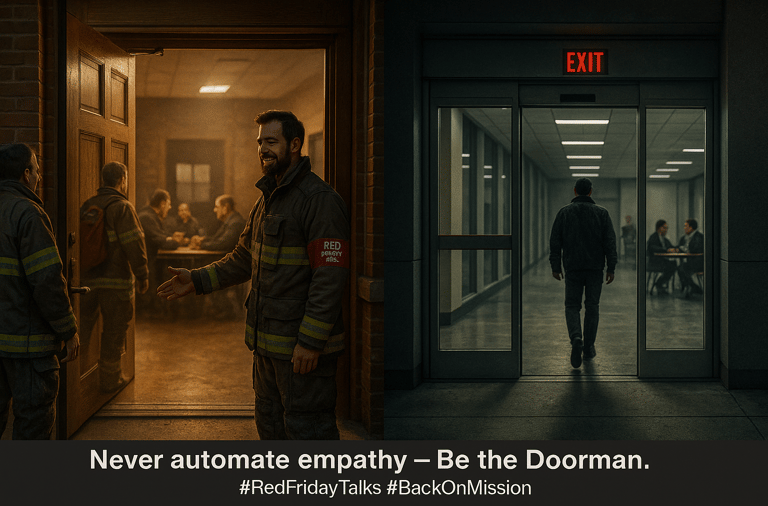The Doorman Fallacy and the Power of Peer Support
Rory Sutherland’s “Doorman Fallacy” describes a trap that leaders and managers often fall into: the belief that efficiency and automation always make things better. He tells the story of a hotel that fires its doorman and installs automatic doors to “save money.” On paper, the numbers look good—no salaries, fewer schedules, no HR issues. But over time, the hotel loses something intangible. Guests feel less welcome. The entrance becomes just another doorway instead of a place of human warmth and reassurance. The doorman was never just a man opening doors—he was part of the hotel’s emotional architecture.
Bob McTaggart - RED Friday Field Notes
10/7/20252 min read


The Doorman Fallacy and the Power of Peer Support
Inspired by Rory Sutherland’s “Introduction to the Doorman Fallacy”
Rory Sutherland’s “Doorman Fallacy” describes a trap that leaders and managers often fall into: the belief that efficiency and automation always make things better. He tells the story of a hotel that fires its doorman and installs automatic doors to “save money.” On paper, the numbers look good—no salaries, fewer schedules, no HR issues. But over time, the hotel loses something intangible. Guests feel less welcome. The entrance becomes just another doorway instead of a place of human warmth and reassurance. The doorman was never just a man opening doors—he was part of the hotel’s emotional architecture.
Now imagine fire departments, first responder units, or even businesses facing the same kind of false efficiency. They might think: “We don’t need a peer support team. We have insurance, benefits, and an EAP hotline.” But that’s the Doorman Fallacy in uniform. You remove the human presence—the trusted, empathetic peer who listens without judgment—and you lose far more than a cost line. You lose morale, trust, and connection.
The Doorman of the Firehall
In a fire service, that “doorman” might be the senior firefighter who checks in after a rough call, or the peer support volunteer who catches burnout before it spreads. When departments replace those informal supports with policy memos or outsourced counselors, they gain efficiency but lose resilience. The result is higher turnover, more sick days, and a slower, quieter erosion of esprit de corps.
Departments like Toronto Fire and Calgary Fire that integrate independent peer support programs have seen tangible results—reduced stress claims, faster recovery, and a healthier culture of care. It’s not just about mental health; it’s about maintaining the “front door” of belonging.
The Doorman of Business
For businesses, the parallel is just as strong. A company might install digital HR platforms, chatbots, and anonymous feedback tools—but if no one takes the time to look an employee in the eye, they’ve automated empathy right out of their brand. Peer support teams—independent, confidential, human—are the modern “doormen” who hold open the emotional door, ensuring people still feel part of something bigger than themselves.
Why Independence Matters
Independent peer support brings a unique value: trust without bureaucracy. When the listener isn’t your boss or HR, real communication begins. This creates psychological safety—the same “intangible” value the doorman gave to the hotel.
At Red Friday Talks, we’ve seen this principle in action with fire departments and small businesses across Canada. When you install trained peer supporters—not to replace mental health professionals but to complement them—you build invisible equity: trust, connection, and purpose. Those aren’t just nice-to-haves. They’re survival skills for teams that serve others.
Back on Mission
Whether you’re running a department, a company, or a crew, remember the Doorman Fallacy. You can’t automate care, loyalty, or courage. You can only cultivate them—one conversation at a time.
Challenge: Before you “optimize” another process or “streamline” another support service, ask yourself—what are we losing that doesn’t fit on the spreadsheet?
Summary:
The Doorman Fallacy warns against replacing human connection with efficiency. Independent peer support programs act as the “doorman” for fire departments, first responders, and organizations—preserving trust, culture, and mental resilience that no automated system can replicate.
#RedFridayTalks #PeerSupport #Leadership #MentalHealth #FireService #BusinessCulture #RorySutherland #BackOnMission
Credit: Bob McTaggart – RED Friday Field Notes
Supporting
GETTING veterans and first responders back on mission!
Veteran-inspired AI Governance & Trust Infrastructure
Trusted by Heroes and Mounted Rifles Management
Veterans and First Responders receive direct support through SupportOurHeroes.Directory
Leadership and peer support are taught through RedFridayTalks.Help
The same governance protections are available to everyone.
© 2026. All rights reserved.